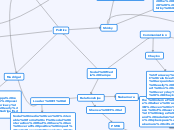Social Media Camps
Communication
Shriky
Philippine Congress voted to set aside key evidence against him. Less than two hours after the decision was announced, thousands of Filipinos, angry that their corrupt president might be let off the hook, converged on Epifanio de los Santos Avenue… The protest was arranged, in part, by forwarded text messages (Shirky 28)
"As the communications landscape gets denser, more complex, and more participatory, the networked population is gaining greater access to information, more opportunities to engage in public speech, and an enhanced ability to undertake collective action" (Shirky 29).
Chayko
"faraway friends, relatives, and acquaintances can easily become part on one’s everyday lives" (Chayko 4)
Relationships
Nakamura
the internet is a place where race happens; even in the absence of users of color, images of race and racialism proliferate in cyberspace” (Nakamura xii).
Shensa Et al
PSMU
Negatively affect peoples lives if Social media is used too often
Loader Et Al
Social media can "enable forms of social interaction that have an overall positive impact on young people’s public orientation" (Loader Et al 147).
Politics
Madrigal
“third-party Facebook apps represented a major possible source of privacy leakage in the early 2010s” (Madrigal 2).
Halpern
Cambridge Analytica stole private Facebook data and used it to test slogans for trumps campaign.
Shirky
People came together through text to impeach the Philippine president (Shirky 28).
Conservative Dilemma
new media is introduced into the area which causes an “increase in public access to speech or assembly" (Shirky 36).
Loader Et al
"participation in
social movements, rallies, protests, consumer boycotts all point to the possible displacement of
traditional models of representative democracy as the dominant cultural form of engagement
by alternative approaches increasingly characterized through networking practices"(Loader Et al 143).

